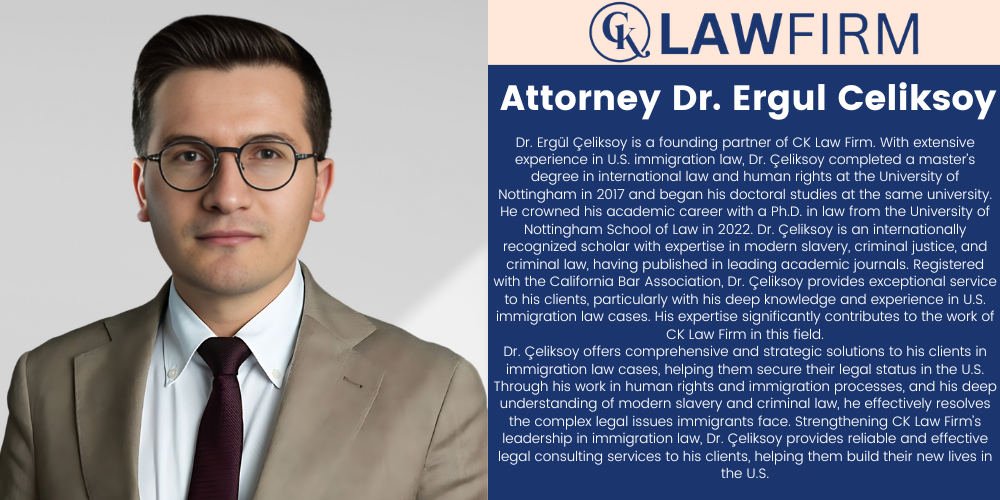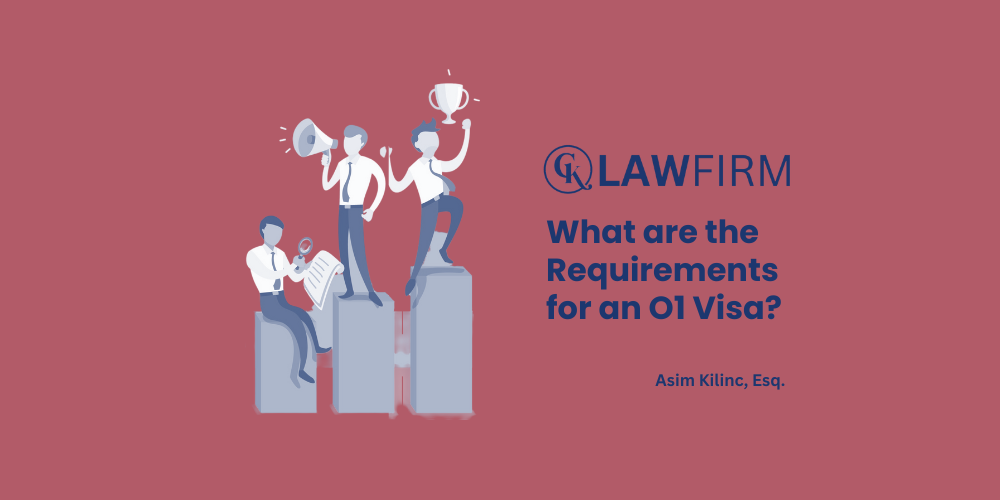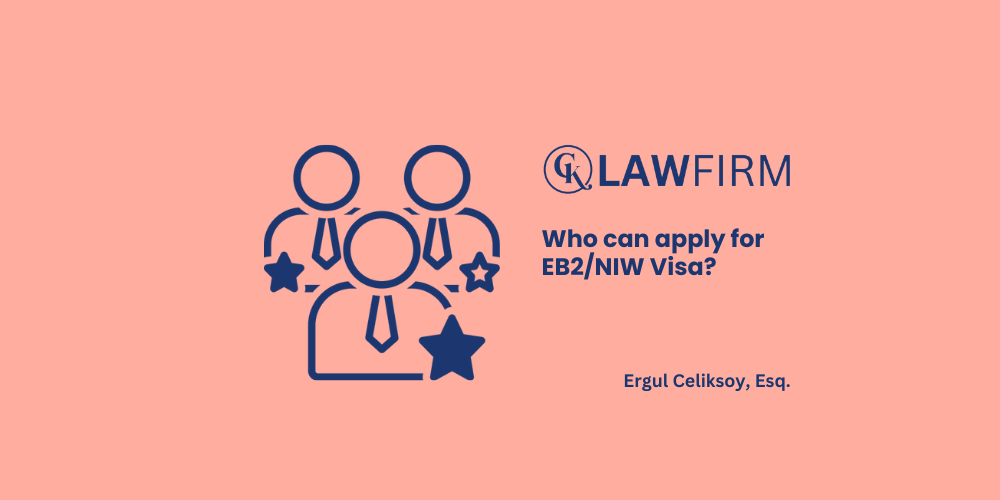Schedule an Appointment with Our Attorneys Now
Asım Kılınç, Immigration Lawyer, CK Law Firm | Content Editor Abdullah Çelik
When you read this article, you will be able to find answers to the following questions about Form I-131F:
- What is Form I-131F?
- Who Can File Form I-131F?
- Which Documents Must be Filed with Form I-131F?
- What Is the Filing Fee for Form I-131F?
- Can I File Form I-131F with Another Form?
- What Should I Expect After I Submit Form I-131F?
- What Happens If My Application Is Denied?
- I Know I Need Legal Help, What Should I Do?
- Can I Travel Outside the U.S. While My Application is Pending or After Approval?
- Can I Work in the U.S. Under Parole in Place?
- What is the Relationship between Form I-131F and Form I-130, Petition for Alien Relative?
- What are the Effects of Form I-131F Approval on Adjustment of Status?
If you have any other questions about Form I-131F, please feel free to contact us via the comments section at the bottom of this article or on the CK Law Firm Immigration Lawyer Webpage.
What is Form I-131F?
Officially known as the “Application for Parole in Place for Certain Noncitizen Spouses and Stepchildren of U.S. Citizens,” Form I-131F is a significant part of immigration to the United States. Under the Citizenship and Immigration Services (USCIS) “Keeping Families Together” program, some noncitizen spouses and stepchildren of U.S. citizens may apply for parole in place (PIP), allowing them to remain in the United States while they pursue lawful permanent resident status. For those who are in the United States without lawful admission or parole, this form is especially crucial since it offers a path to regularizing their status without having to leave the country, which can often be a difficult and complicated process.
Parole in place (PIP) is a discretionary action by the Department of Homeland Security (DHS) that allows noncitizens who are in the U.S. illegally to temporarily stay in the country. Given they satisfy all other eligibility criteria, this status helps them avoid deportation and provides a legal basis for them to apply for a green card through adjustment of status.
Who is Eligible to File Form I-131F?
Eligibility to file Form I-131F is especially restricted to certain groups of noncitizens with close ties to U.S. citizens. Here is a comprehensive list of those who might qualify:
Noncitizen Spouse of a U.S. Citizen
- Here, you can find information about fulfilling the requirements as a noncitizen spouse of a U.S. citizen.
- Physical and Continuous Presence: You must be physically present in the U.S. without having been paroled or lawfully admitted. You either overstayed your visa or entered the country without undergoing official immigration processing. From at least June 17, 2014, through the date you submit your application, you must have been continuously physically present in the United States. Being continuously present shows your long-term ties to the United States.
- Marriage: Your marriage must take place on or before June 17, 2024, and you have to be legally married to a U.S. citizen. The marriage needs to be legitimate and not motivated solely by immigration.
- Criminal History: You should not be seen as a threat to public safety, border security, or national security, nor have a notable criminal past. Disqualifying offenses include most drug offenses, sexual assault, domestic violence, and murder.
Noncitizen Stepchild of a U.S. Citizen
- To be eligible to file Form I-131F as a noncitizen stepchild of a U.S. citizen, you need to prove:
- Physical and Continuous Presence: Like the spouse requirements, you must be physically present in the United States without lawful admission or parole. From at least June 17, 2024, through the date of your application, you must have been continuously physically present in the United States.
- Parental Marriage: Before your 18th birthday and on or before June 17, 2024, your noncitizen parent must have been legally married to a U.S. citizen. This clarifies the stepchild relationship.
- Marital Status: To fit under this category, you must have been unmarried as of June 17, 2024, and under the age of twenty-one.
- Criminal History: Any notable criminal history could prevent you from being granted parole in place, similar to the category for spouses.
Which Documents Need to Be Filed with Form I-131F?
Gathering and submitting the right supporting documentation is crucial when preparing to submit Form I-131F. These records help to prove your eligibility for parole in place. Here is a comprehensive list of the records you will need:
Proof of Identity
- Remind you that expired documents can be filed alongside other supporting documentation and that if any of your papers are not in English, you must include a certified translation of the entire document into English before outlining how you prove your identity.
- Valid Government-Issued Driver’s License or ID: This should be a formal government document, such as a state ID card or driver’s license. It must clearly display your name, picture, and birthdate.
- Your Passport’s Identity Page: This page, which comprises your name, picture, passport number, and other personal information, serves as the main source of identity confirmation.
- National ID Card from Your Home Country: If you have a national ID card from your country of birth, you should send a copy. This sheet should have your picture and personal information.
- School ID Card with Photo: For candidates still in school, a school ID card with your photo can be submitted as additional proof of identity.
Proof of Either Spouse’s or Stepparent’s U.S. Citizenship
- U.S. Birth Certificate: If your stepparent or spouse was born in the United States, a copy of their birth certificate will prove citizenship.
- Naturalization Certificate: If your spouse or stepparent naturalized as a U.S. citizen, you should present a copy of their naturalization certificate.
- Certificate of Citizenship: Those who obtained or derived citizenship from their parents are issued this certificate. One copy will be sufficient evidence of citizenship.
- U.S. Passport: A current or expired U.S. passport is also acceptable evidence of citizenship.
Proof of Relationship
- Marriage Certificate: You have to hand in a certified copy of your marriage certificate, which attests to the legal recognition of your marriage.
- Documentation of Termination of Previous Marriages: If either partner had a previous marriage, you have to present death certificates, divorce decrees, or annulment orders proving that all previous marriages were legally ended.
- Birth Certificate: To prove the parental relationship for stepchildren, a birth certificate that includes the name of the noncitizen parent is required.
- U.S. Death Certificate: If your U.S. citizen spouse or stepparent died, you must provide a death certificate as evidence.
Evidence of Ongoing Physical Presence
- You should provide a combination of the following records to show your ongoing physical presence in the United States:
- Utility Bills or Rent Receipts: These can prove that you have lived at a given U.S. address consistently.
- IRS Tax Transcripts or Copies of Recently Filed Tax Returns: These provide proof of your ongoing presence.
- School Records: If you have children enrolled in school, their records will show your presence in the U.S. over time.
- Medical Records: Including doctor’s visits and vaccination records, these allow one to show ongoing presence.
- Participation in Religious Events or Consistent Attendance at a Place of Worship: These will help to prove your ongoing presence in the United States.
Evidence of Criminal History, if relevant
- If you have a criminal record, you must provide:
- Court-Certified Copies of Criminal Records: These include arrest records, charging documents, and final court rulings.
- Official Statement from Arresting Agency: If you were arrested but not charged, you should get a statement from the arresting agency attesting that no charges were filed.
- Documentation of Vacated or Expunged Convictions: If you had a conviction revoked, expunged, or sealed, you should provide pertinent court orders or statements verifying this.
More Evidence (if relevant)
- Documentation Supporting Urgent Humanitarian Reasons or Significant Public Benefit: This could include proof of community ties, vulnerability resulting from age or illness, or the effects of your deportation on U.S. citizen family members.
- Personal Statement: A 750 to 2000-word personal statement outlining your circumstances and the reason you are seeking parole in place. This is your chance to provide any unusual situation or difficulty USCIS should take into account while reviewing your application.
How Much Does Filing Form I-131F Cost?
Form I-131F carries a $580 filing fee. This form does not offer a fee waiver, so you should be prepared to pay this amount when you apply. The form can only be submitted online via the USCIS website. Any attempt at a paper application will be denied, and you will lose the filing fee.
Can I File Form I-131F Alongside Another Form?
No, Form I-131F cannot be filed concurrently with Form I-765, Application for Employment Authorization. USCIS mandates waiting for the approval of your Form I-131F before requesting work authorization. This means that even if you qualify for an Employment Authorization Document (EAD), you have to follow the parole in place procedure first and get a positive outcome before filing Form I-765.
After Submitting Form I-131F, What Should I Expect?
Several steps follow in the application process once you submit Form I-131F. You should expect:
- Receipt Notice: Your USCIS online account will show a receipt notice immediately upon submission of your form. This notice certifies that your application is under processing and has been received.
- Biometrics Appointment: Most applications will require attendance at a biometrics appointment. Your fingerprints, picture, and signature will be taken for background checks during this visit. You will be notified of your appointment along with the date, time, and location.
- Request for Evidence (RFE): If USCIS finds that further information or documentation is required to decide your case, they will send a Request for Evidence (RFE). Responding to an RFE quickly and completely is essential since neglecting to do so could cause your application to be denied.
- Interview: As part of the application process, USCIS could ask you to attend an interview. During the interview, a USCIS officer will probe your application, background, and motivations for seeking parole in place. Be ready to go into detail about every element of your case.
- Decision: Once USCIS has examined all required records and documentation, they will make a decision. Your USCIS online account will notify you of the ruling. If approval is granted, you will receive a Form I-797, Approval Notice, along with a copy of your Form I-94, Arrival/Departure Record, indicating the validity period of your parole in place.
What Happens If My Application Is Denied?
If your application for parole in place is denied, USCIS typically will not initiate removal actions based solely on the denial. However, if you are deemed a priority under current policies, DHS retains discretion to start immigration enforcement activities if you are considered a threat to national security, public safety, or border security.
Although you cannot appeal the denial of your Form I-131F, you could submit a fresh request including new or additional evidence along with the necessary filing fee. Review the reasons behind your denial carefully and address them in your next application to raise your chances of approval.
Knowing I Need Legal Help, What Should I Do?
The process of applying for parole in place can be complicated and difficult, particularly when considering issues like continuous physical presence, criminal history, and eligibility for adjustment of status. Consult an experienced immigration attorney whether you are considering submitting Form I-131F or have already filed and encountered problems.
An attorney can help you draft your application, ensure all required records are included, and represent you in any contacts with USCIS. Given the high stakes in immigration matters, professional legal advice can significantly affect the outcome of your case.
Can I Travel Outside of the United States? Either While My Application Is Pending or Following Approval?
Traveling outside the United States while your application is pending—or even after parole in place—can cause major problems. If you leave the United States after receiving parole in place, your parole will automatically end, and you might be denied re-entry. Parole in place does not grant travel permission. You would need an Advance Parole Document to travel, but even with this document, re-entry is not guaranteed. It is strongly advised to refrain from international travel during the parole process.
Could I Be Employed in the United States Under Parole in Place?
Indeed, if your request for parole in place is granted, you can apply under eligibility category (c)(11) for an Employment Authorization Document (EAD) by Form I-765, Application for Employment Authorization. You have to wait, though, until your Form I-131F is approved before submitting Form I-765. The filing fee for Form I-765 is $520 if filed on paper or $470 if filed online. Fee waivers for Form I-765 are available only if you file by mail.
How Do Form I-131F and Form I-130, Petition for Alien Relative, Relate?
Form I-130 is the petition a U.S. citizen spouse or stepparent files on behalf of a noncitizen spouse or stepchild to establish the family relationship needed for a green card application. Your U.S. citizen spouse or stepparent still must file Form I-130 even if you are granted parole in place to change your status to lawful permanent resident (LPR). Though they must be filed separately, Form I-130 can be filed before, during, or after the Form I-131F process.
The U.S. citizen stepparent must show for stepchildren that the marriage to the noncitizen parent was bona fide—that is, it was not entered into solely for immigration needs.
Regarding I-601A Provisional Unlawful Presence Waivers:
If you have accumulated unlawful presence in the United States, you might have to submit Form I-601A, Application for Provisional Unlawful Presence Waiver, to remove the bars to re-entry applicable upon leaving the country in order to obtain a visa. However, if you are granted parole under Form I-131F and subsequently seek to adjust your status (Form I-485), you will not have to leave the United States, and thus you might not need a provisional unlawful presence waiver.
You can still apply for parole in place if you have an approved or pending Form I-601A. However, if your Form I-131F is approved and you seek to adjust your status, your pending Form I-601A will be denied since it would not be required. To avoid any discrepancies, ensure all biographic data on Form I-131F matches the information on your Form I-601A.
What Effects on Status Adjustment Would Form I-131F Approval Have?
Approval of Form I-131F and the following grant of parole in place allows you to stay in the U.S. and possibly change your status to a lawful permanent resident (LPR). You must file Form I-485, Application to Register Permanent Residence or Adjust Status, to accomplish this. A grant of parole in place meets the criteria under INA 245(a), which state an applicant must have been inspected and admitted into the United States.
However, applying for a change of status will still be assessed for admissibility, including any unlawful presence you might have accumulated prior to the parole grant. If you were unlawfully present prior to parole in place, this could affect your eligibility for adjustment of status and require either waivers or other legal action.
By Asim Kilinc, Immigration Attorney at CK Law Firm
The F1 Visa is a temporary immigrant student visa granted to international students who wish to study in the United States. One of the most frequently asked questions by individuals applying for the F1 visa is whether they can work while holding this visa. In this article, we will answer the following questions:
- What is an F1 Visa?
- How Many Hours Can You Work Per Week with an F1 Visa?
- How to Work On-Campus with an F1 Visa?
- How to Work Off-Campus with an F1 Visa?
If you have additional questions regarding the F1 visa, please do not hesitate to contact me via the comments section below this article, by sending a direct message on LinkedIn, or through the CK Law Firm Immigration Law Firm’s website, where I am a co-founder.
What is an F1 Visa?
The F1 Visa is a temporary immigrant student visa granted to international students who wish to study in the United States. The F1 Student visa indicates that the applicant has been accepted by an educational institution in the United States, can cover their expenses while studying, and will return to their home country upon completing their studies. The accepted institution could be a language school, undergraduate, associate degree, or doctorate program.
How Many Hours Can You Work Per Week with an F1 Visa?
Working hours while studying in the United States on an F1 visa are subject to specific regulations:
On-Campus Work:
- During the Term: You can work up to 20 hours per week.
- During Holidays: You can work up to 40 hours per week during summer, winter, or other official holidays.
Off-Campus Work: Off-campus work permits are generally granted after graduation and under specific programs. However, these work hours are typically subject to similar restrictions and may vary depending on the type of job.
It is crucial to adhere to these hourly limits, as violating them may result in the cancellation of your F1 visa and loss of your legal status in the United States.
How to Work On-Campus with an F1 Visa?
Working on-campus with an F1 visa is a popular option for international students in the United States. On-campus work allows students to earn legally and gain work experience. Here are the steps to work on-campus with an F1 visa:
Identify Suitable Jobs:
- On-campus jobs are positions located within the university’s facilities. These can include working in the library, student center, cafeteria, as a teaching assistant, or research assistant.
Job Application:
- Explore job opportunities through your university’s career center, student affairs office, or online job listings.
- You may need to prepare a resume (CV) and cover letter when applying for jobs. Additionally, some positions may require you to participate in an interview.
Social Security Number (SSN) Application:
- To work legally in the United States, you must obtain a Social Security Number (SSN).
- You can apply for an SSN by obtaining the necessary documents from your employer or student advisor. Typically, you will need your passport, F1 visa, I-20 form, and a confirmation letter from your university.
Work Hours and Tax Obligations:
- Plan your work hours not to exceed the weekly 20-hour limit.
- You may be required to pay taxes on your earnings from on-campus work. Therefore, you may need to file a tax return each year.
How to Work Off-Campus with an F1 Visa?
Working off-campus with an F1 visa in the United States is possible under certain conditions and is generally limited to specific programs.
Curricular Practical Training (CPT):
CPT allows off-campus work as part of your educational program. Internships, cooperative education programs, or on-the-job training can be considered CPT.
Requirements:
- CPT must be directly related to your studies.
- The student must have completed at least one academic year of full-time study.
- You must obtain approval from your academic advisor and your university’s international student office.
Work Duration:
- You can work full-time (more than 20 hours per week) or part-time (less than 20 hours per week) under CPT.
How to Apply:
- Once you find a suitable job for CPT, you must obtain CPT approval on your I-20 form from your university’s international student office.
- Do not start work without providing this approval to your employer.
Optional Practical Training (OPT)
OPT allows F1 visa holders to work off-campus either before or after completing their educational program. OPT is commonly used to gain work experience after graduation.
Requirements:
- OPT must be in a field related to your studies.
- Each student is entitled to a total of 12 months of OPT; students in STEM (Science, Technology, Engineering, Mathematics) fields may be eligible for a 24-month extension.
Work Duration:
- Pre-completion OPT: You can work less than 20 hours per week during your studies.
- Post-completion OPT: You can work full-time after graduation.
How to Apply:
- It is recommended to apply for OPT no later than 90 days before graduation.
- You must submit Form I-765 and other required documents to USCIS to apply.
- Once approved, you can start working on the designated dates.
Severe Economic Hardship
If you face unexpected economic hardship and find that on-campus work is insufficient, you may apply for an off-campus work permit.
Requirements:
- You must have been a full-time student in F1 status for at least one academic year.
- You must demonstrate that off-campus work is necessary due to economic hardship.
How to Apply:
- You must apply to USCIS by submitting Form I-765 with supporting documents.
- You may need to obtain a recommendation letter from your international student office.
- Once approved, you can start working off-campus.
International Organizations
You can obtain permission to work off-campus for certain international organizations. These organizations may include large institutions such as the United Nations.
Requirements:
- The job must be within the scope of an international organization and related to your studies.
How to Apply:
- You should contact your international student office to arrange your I-20 form.
- You must apply to USCIS to obtain a work permit.
Social Security Number (SSN)
- You will need to obtain a Social Security Number (SSN) to work. You may need to obtain the necessary documents from your employer or international student office to apply for an SSN.
Tax Obligations
- You are required to pay taxes on your earnings during the period of off-campus work. It is important to file a tax return each year and pay the correct amount of taxes.
Working off-campus without a work permit can lead to the cancellation of your F1 visa and the loss of your legal status in the United States. Therefore, it is extremely important to follow every step correctly and comply with the law. It is advisable to consult your international student advisor or an immigration attorney for any job opportunities.
Working off-campus with an F1 visa in the United States can be a great way to gain work experience and start your career strong. However, it is important to pay attention to legal requirements during this process.
Feel free to contact us at cklawfirm.org or directly reach out to me on LinkedIn to find out if you qualify for an F1 visa through our free consultation service. All you need to do is send us your resume. We will review it and get back to you within 24 hours.
Who is Attorney Asım Kılınç?
Attorney Asım Kılınç is the co-founder of CK Law Firm and is recognized for his expertise in immigration law and U.S. asylum applications. Kılınç completed his Master’s degree at Southern Methodist University Dedman School of Law and is a member of the Missouri Bar Association, with a focus on U.S. immigration law.
Attorney Kılınç’s extensive knowledge and experience in immigration law have significantly contributed to CK Law Firm’s success in this field. He has actively participated in the preparation of over 1,000 cases, demonstrating his expertise in this area. By providing comprehensive and professional legal support to his clients, he helps them adapt to their new lives in the U.S.
Attorney Kılınç is also well-versed in U.S. asylum applications. He meticulously guides his clients through the process and ensures they receive the best legal advice. He provides top-quality service to clients in matters of citizenship, Green Card, work permits, and other immigration processes, supporting them from start to finish on their journey to U.S. citizenship.
Attorney Asım Kılınç, who solidifies CK Law Firm’s leadership in immigration law and U.S. asylum applications, offers reliable and effective legal consultancy services to clients, assisting them in building a new life in the U.S.
By Ergul Celiksoy, Immigration Attorney at CK Law Firm
For many people who want to live and work in the United States, a Green Card means permanent residency and is the first major step towards becoming a U.S. citizen. Holding a Green Card allows an individual to reside in the U.S. indefinitely, provides a work permit, and grants access to many social benefits. There are several ways to obtain a Green Card, and each method may vary depending on the applicant’s personal, family, or professional situation. In this article, we will discuss the most common ways to obtain a Green Card in detail:
- Family-Based Green Card
- Employment-Based Green Card
- Investment-Based Green Card (EB-5 Program)
- Green Card through Refugee or Asylum Status
- Diversity Visa Program (DV Lottery)
- Green Card through Fiancé Visa (K-1)
If you have any questions related to this topic, feel free to reach out through the comment section below, send me a message directly on LinkedIn, or contact me through CK Law Firm’s website!
1. Family-Based Green Card
One of the most common ways to get a Green Card is through family connections. If you have a U.S. citizen or Green Card-holding relative, this method may be right for you. However, the duration and likelihood of approval for family-based applications depend on the degree of the family relationship.
Family-Based Green Card Categories:
- Marriage to a U.S. Citizen: Foreigners who marry a U.S. citizen can apply for a Green Card through marriage. This process is typically faster than other methods, but proof of a genuine relationship is crucial. The applicant must provide documents and evidence of shared life. Upon approval, a two-year conditional Green Card is granted, after which a permanent Green Card can be applied for.
- Immediate Relatives of U.S. Citizens: U.S. citizens can file for their parents, children under 21, and siblings. Applications for immediate relatives are processed faster because they are not subject to annual quotas.
- Family Members of Green Card Holders: Green Card holders can apply for their spouses and unmarried children. These applications usually take longer to process compared to those sponsored by U.S. citizens.
2. Employment-Based Green Card
For those working in the U.S., another way to obtain a Green Card is through employer sponsorship or applying under the extraordinary ability category. This method is ideal for qualified professionals and individuals who have received a job offer.
Employment-Based Green Card Categories:
- EB-1 Category (Individuals with Extraordinary Ability): This category is for individuals with extraordinary abilities in the fields of science, arts, education, business, or sports. It also includes outstanding professors, researchers, and executives of multinational companies. EB-1 applications are processed faster than other employment-based applications.
For detailed information about EB-1 visa, you can take a look at our article on the subject!
- EB-2 Category (Advanced Degree Professionals): EB-2 is for professionals with at least a master’s degree or individuals with exceptional expertise in their field. National Interest Waiver (NIW) applicants also fall under this category, where the individual’s work serves U.S. national interests, and employer sponsorship is not required.
For detailed information about EB-2 visa, you can take a look at our article on the subject!
- EB-3 Category (Skilled Workers and Professionals): EB-3 is for skilled workers with at least two years of experience, professionals with a bachelor’s degree, and unskilled workers. Employer sponsorship is usually required for this category, and the application process can be longer.
For detailed information about EB-3 visa, you can take a look at our article on the subject!
3. Investment-Based Green Card (EB-5 Program)
Investors can obtain a Green Card by making a substantial investment. The EB-5 visa requires a minimum investment of $1.8 million (or $900,000 in designated economically distressed areas) and the creation of at least 10 full-time jobs for U.S. workers.
EB-5 Program Requirements:
- The investment must directly or indirectly create at least 10 jobs.
- After approval, the investor receives a two-year conditional Green Card. If the investment and job creation are maintained during this period, the investor can apply for a permanent Green Card.
For detailed information about EB-5 visa, you can take a look at our article on the subject!
4. Green Card through Refugee or Asylum Status
Individuals who have been granted refugee or asylum status in the U.S. can apply for a Green Card after residing in the country for one year. This type of application is often made by those fleeing persecution, coming from war zones, or experiencing serious human rights violations.
5. Diversity Visa Program (DV Lottery)
The U.S. government holds a Green Card lottery every year for immigrants from certain countries. This program allows people from underrepresented nations to immigrate to the U.S. as permanent residents. To apply, candidates typically need to have a high school diploma or relevant work experience.
DV Lottery Eligibility Requirements:
- The applicant must be from an eligible country with a low immigration rate to the U.S.
- A high school diploma or at least two years of work experience within the last five years is required.
- Participation in the DV Lottery is free, but millions apply each year, so the odds of winning are limited.
For detailed information about DV Lottery, you can check our article on the subject!
6. Green Card through Fiancé Visa (K-1)
Individuals engaged to U.S. citizens can enter the country with a K-1 fiancé visa. This visa requires the couple to marry within 90 days of arrival, after which the foreign spouse can apply for a Green Card.
K-1 Visa Requirements:
- The applicant must prove they are engaged to a U.S. citizen.
- The couple must provide evidence of their intent to marry.
- The marriage must take place within 90 days of entering the U.S.
For detailed information about K-1 visa, you can take a look at our article on the subject!
Conclusion
There are many different ways to obtain a Green Card, and the process can be complex depending on the applicant’s individual circumstances. Whether through family, work, investment, or even the DV Lottery, each method requires different steps and documentation. To ensure a successful application, it’s important to seek guidance from a professional.
At CK Law Firm, we are ready to assist you throughout the Green Card application process. If you have any questions or are ready to start the process, please contact us. For professional support, detailed information, and consultation services, reach out to us at cklawfirm.org, via email at info@cklawfirm.org, or on LinkedIn.
Who is Attorney Ergül Çeliksoy?
Attorney Dr. Ergül Çeliksoy is a founding partner of CK Law Firm and also serves as an Assistant Professor of Law at the University of Nottingham. With extensive experience in U.S. immigration law, Dr. Çeliksoy completed a Master’s degree in international law and human rights law at the University of Nottingham in 2017, followed by a Ph.D. at the same university. His Ph.D., completed in 2022 at the University of Nottingham School of Law, marked a significant milestone in his academic career. Dr. Çeliksoy has published extensively in leading academic journals and is internationally recognized for his expertise in modern slavery, criminal justice, and criminal law. As a member of the California Bar, Dr. Çeliksoy offers exceptional service to his clients, particularly in U.S. immigration law cases. His expertise and experience in immigration law significantly contribute to CK Law Firm’s work in this area.
Dr. Çeliksoy provides comprehensive and strategic solutions to his clients in immigration law cases, helping secure their legal status in the U.S. His work on human rights and immigration processes, particularly in modern slavery and criminal law, effectively addresses the complex legal issues immigrants face. Dr. Çeliksoy reinforces CK Law Firm’s leadership in immigration law by offering reliable and effective legal consulting services to his clients, helping them build new lives in the United States.
By Asim Kilinc, Immigration Attorney at CK Law Firm
The O1 visa is a prestigious immigrant visa that provides permanent residency in the United States for individuals with extraordinary abilities. This visa type is specifically designed for those who have achieved international recognition in fields such as science, arts, education, business, or athletics.
- What is an O1 Visa?
- What are the Differences Between O1-A and O1-B Visas?
- What are the Requirements for Applying for an O1-A Visa?
- What are the Requirements for Applying for an O1-B Visa?
If you have any additional questions about the O1 visa type, please do not hesitate to reach out to me via the comments section below this article, by sending a message directly on LinkedIn, or through the CK Law Firm Immigration Law Firm website, of which I am a co-founder.
What is an O1 Visa?
The O1 visa, or Individuals with Extraordinary Ability or Achievement visa, is a type of temporary employment visa available to individuals who have achieved success in science, arts, athletics, business, or education as determined by the USCIS. There are two categories under this visa type: O1-A and O1-B.
What are the Differences Between O1-A and O1-B Visas?
O-1A and O-1B visas are issued to individuals with extraordinary abilities in the United States, but they cater to different fields. Here are the primary differences between the O-1A and O-1B visas:
O-1A Visa:
- The O-1A visa is for individuals with extraordinary abilities in fields such as science, education, business, or athletics.
- The applicant must demonstrate extraordinary achievements in their field, evidenced by internationally recognized awards, publications, or other significant accomplishments.
- This visa covers a broad professional spectrum and is often chosen by scientists, academics, recognized business leaders, top executives, and professional athletes.
O-1B Visa:
- The O-1B visa is designed for individuals with extraordinary abilities in the arts, cinema, or television industries.
- Applicants must provide evidence of extraordinary abilities in the arts, such as winning significant awards or participating in widely recognized projects.
- This visa is commonly used by actors, singers, dancers, directors, musicians, and other artists.
What are the Requirements for Applying for an O1-A Visa?
When applying for an O-1A visa, the USCIS requires the applicant to meet specific criteria to prove their extraordinary abilities. The applicant must meet at least three of the following eight criteria:
Having Won Awards or Prizes:
The applicant must have won nationally or internationally recognized awards or prizes in their field. These awards prove the applicant’s extraordinary abilities and prominent position in their field.
Being Featured in Recognized Publications or Media:
The applicant must have articles or news features about them in recognized professional publications, mainstream media, or trade publications. These articles should showcase the applicant’s achievements and recognition in their field.
Serving as a Judge for Others’ Work:
The applicant must have served as a judge for others’ work in their field or a related field. This demonstrates the applicant’s expertise in their area of specialization.
Making Significant Contributions in the Field:
The applicant must have made original scientific, academic, or commercial contributions in their field. These contributions should bring innovations or advancements in their field.
Membership in Recognized Professional Associations:
The applicant must be a member of a recognized professional association where membership is limited to those who have shown extraordinary achievement. This membership demonstrates the applicant’s competence and prestige in their field.
Having Published Work in Recognized Professional or Trade Publications or Media:
The applicant’s work must have been published in recognized professional journals, trade publications, or other media sources. These publications should prove the applicant’s expertise and influence in their field.
Receiving High Salary or Compensation:
The applicant must have received or be currently receiving a high salary compared to others in their field. This indicates the applicant’s value and competence in their area.
Commercial or Professional Success in the Field:
The applicant must have achieved recognized commercial success in their field. These successes demonstrate the applicant’s advanced level in their career and their extraordinary abilities in their field.
Applicants who meet at least three of these criteria may be eligible for the O-1A visa. The USCIS carefully evaluates each application and expects applicants to clearly demonstrate their extraordinary abilities and achievements in their field.
What are the Requirements for Applying for an O1-B Visa?
The O-1B visa is granted to individuals with extraordinary abilities in the arts, cinema, or television industries. The USCIS requires applicants to meet at least three of the following six criteria:
Having Played a Leading or Significant Role:
The applicant must have played a leading or significant role in a recognized production. This role should demonstrate the applicant’s artistic talents and recognition in their field.
Receiving Praise from Recognized Critics, Organizations, or Media:
The applicant’s artistic talents and achievements must have received praise from recognized critics, organizations, or media outlets. These accolades should support the applicant’s extraordinary abilities.
Achieving Commercial Success or Making Significant Contributions with a Recognized Organization or Institution:
The applicant must have worked with a recognized organization or institution to achieve commercial success or make significant contributions. These successes demonstrate the applicant’s extraordinary abilities in their field.
Participating in Artistic Activities Undertaken by Recognized Institutions, Organizations, or Government Agencies:
The applicant must have participated in artistic activities organized by recognized institutions, organizations, or government agencies. These activities should provide an opportunity for the applicant to showcase their talents.
Receiving High Salary or Compensation for Their Work:
The applicant must have received or be in the process of negotiating a high salary for their work. This shows the applicant’s artistic talents’ value and market presence.
Playing a Leading or Significant Role in Recognized Artistic Groups, Organizations, or Collaborative Projects:
The applicant must have played a leading or significant role in recognized artistic groups, organizations, or projects. This role should demonstrate the applicant’s leadership and competence in their field.
Applicants who meet at least three of these criteria may be eligible for the O-1B visa. The USCIS expects applicants to provide sufficient documentation and evidence to prove their extraordinary abilities in the arts, cinema, or television industries.
Applying for an O1 visa can be a complex process, but you can increase your chances of success by following the correct steps and providing the necessary documents. If you wish, you can contact me via cklawfirm.org or LinkedIn to find out if you are eligible for an O1 visa through our free consultation service. All you need to do is send us your CV. We will review your CV and get back to you within 24 hours.
Who is Attorney Asım Kılınç?
Attorney Asım Kılınç is the co-founder of CK Law Firm and is recognized for his expertise in immigration law and U.S. asylum applications. Kılınç completed his Master’s degree at Southern Methodist University Dedman School of Law and is a member of the Missouri Bar Association, with a focus on U.S. immigration law.
Attorney Kılınç’s extensive knowledge and experience in immigration law have significantly contributed to CK Law Firm’s success in this field. He has actively participated in the preparation of over 1,000 cases, demonstrating his expertise in this area. By providing comprehensive and professional legal support to his clients, he helps them adapt to their new lives in the U.S.
Attorney Kılınç is also well-versed in U.S. asylum applications. He meticulously guides his clients through the process and ensures they receive the best legal advice. He provides top-quality service to clients in matters of citizenship, Green Card, work permits, and other immigration processes, supporting them from start to finish on their journey to U.S. citizenship.
Attorney Asım Kılınç, who solidifies CK Law Firm’s leadership in immigration law and U.S. asylum applications, offers reliable and effective legal consultancy services to clients, assisting them in building a new life in the U.S.
By Ergul Celiksoy, Immigration Attorney at CK Law Firm
The EB2/NIW Green Card visa is an immigrant visa designed for individuals who can make significant contributions to the United States. This visa offers permanent residency without requiring employer sponsorship, making it particularly suitable for experts in fields such as science, technology, engineering, medicine, and business.
If you are considering applying for a Green Card in the U.S. but are unsure whether the EB2/NIW visa is the right choice for you, we recommend reading this article until the end. Below, we will cover the following key topics:
- Eligibility Criteria for the EB2/NIW Visa
- Required Documents for Application
- Application Process Steps
- Key Advantages of the EB2/NIW Visa
- Why Choose the EB2/NIW Visa?
If you have any further questions or need more information, feel free to contact us through our website. You can also connect with me on LinkedIn for personal inquiries. Enjoy reading!

Eligibility Criteria for the EB2/NIW Green Card Visa
To be eligible for the EB2/NIW visa, you must meet at least one of the following criteria:
1. Education and Academic Background
- Master’s Degree or Higher: Holding at least a master’s degree.
- Alternative Path (Bachelor’s Degree + Experience): Having a bachelor’s degree along with at least five years of progressive work experience in a specialized field.
- Academic Publications: Having research articles published in peer-reviewed journals.
2. Professional Experience and Field of Expertise
- Contributions to the U.S. Economy or Scientific Infrastructure: Your work should provide national interest benefits to the U.S.
- Innovation and Technological Contributions: Developing new technologies or holding patents.
- Global or National Awards: Receiving prestigious awards in your field.
3. National Interest Waiver Justification
- Your work must be in a critical field for the U.S. (e.g., healthcare, energy, education, artificial intelligence, etc.).
- You must work in an industry facing a skilled labor shortage in the U.S.
Required Documents for Application
To successfully apply, you must submit the following official documents:
| Required Document | Description |
|---|---|
| Diplomas and Transcripts | At least a bachelor’s or master’s degree is required. |
| Proof of Work Experience | Documents verifying a minimum of five years of relevant experience. |
| Reference Letters | Letters of recommendation from industry experts. |
| Publications and Patents | Research papers, articles, books, or patent documentation. |
| Professional Certifications | Certificates demonstrating expertise in your field. |
| Awards and Recognition | Documents supporting your professional achievements. |
| Projects and Contributions | Details of projects that contribute to U.S. national interests. |
Eligible Professions for the EB2/NIW Green Card Visa
1. STEM (Science, Technology, Engineering, and Mathematics) Professionals
- Software engineers
- Data scientists and AI specialists
- Robotics and automation engineers
- Biotechnology and genetic engineers
- Energy and environmental science researchers
2. Healthcare and Medical Experts
- Doctors and surgeons
- Clinical researchers
- Public health specialists
- Nurses and medical technicians
3. Business and Entrepreneurship
- Startup founders
- Business development professionals
- Finance and investment consultants
4. Arts, Culture, and Creative Industries
- Filmmakers
- Musicians and composers
- Art directors
- Fashion designers
5. Aerospace and Aviation Professionals
- Pilots and flight instructors
- Space researchers
- Satellite engineers
6. Law, Education, and Social Sciences
- Academics and researchers
- Legal professionals
- Educational technology developers

EB2/NIW Green Card Application Process Steps
1. Initial Evaluation
- Assess whether you meet the eligibility criteria.
- Gather your academic and professional achievements.
- Identify how your work benefits the U.S. at a national level.
2. Collecting Documents
- Prepare diplomas, work experience records, awards, and certifications.
- Obtain reference letters from experts in your field.
- Create a detailed portfolio of your publications and projects.
3. Submitting the Application
- File Form I-140 to initiate the application process.
- Follow the latest guidelines issued by the U.S. Citizenship and Immigration Services (USCIS).
- Consider seeking legal assistance to streamline the process if necessary.
4. Approval and Green Card Issuance
- Wait for USCIS to review and approve your application.
- After approval, complete the remaining steps for obtaining an immigrant visa.
- Enter the U.S. and receive your permanent residency status.
Key Advantages of the EB2/NIW Green Card Visa
- No employer sponsorship required – you can apply independently.
- Opportunity for permanent residency (Green Card) in the U.S.
- A more flexible process compared to other immigrant visas.
- Approval is based on proven expertise in your field.
- Your spouse and children under 21 can also obtain a Green Card.
Why Choose the EB2/NIW Visa?
- Employer Independence: Freedom to switch jobs or start your own business in the U.S.
- Faster Processing: A quicker process compared to the standard EB-2 visa.
- Prestige: Recognizes and validates your expertise.
- Career Opportunities: Access to a broader range of job prospects in the U.S.
The EB2/NIW Green Card visa is an excellent immigration opportunity for experts in science, engineering, technology, medicine, and business. If you want to live and work permanently in the U.S., carefully assess your qualifications and start your application process today.
For more information, you can visit our official website. If you have any personal questions, feel free to connect with me on LinkedIn.
Note: Before applying, it is crucial to prepare a strong portfolio detailing your contributions to your field. Supporting your application with data, references, and evidence of your national interest contributions will significantly enhance your chances of approval.

By Asim Kilinc, Immigration Attorney at CK Law Firm
The United States is widely regarded as a global hub for commerce. Many international companies aim to support their growth by opening new branches in the U.S. For companies looking to establish a presence or expand operations in the U.S., the L1 visa provides significant advantages. This visa is specifically designed for multinational companies to transfer executives and employees with specialized knowledge to the U.S. However, both the applicant and the company must meet several specific requirements to qualify for this visa. In this article, we will examine the key features, requirements, and benefits of the L1 visa in detail:
- What is the L1 Visa?
- L1 Visa Requirements
- Advantages of the L1 Visa
- L1 Visa Application Process
If you have further questions related to this topic, feel free to reach out via the comments section, send me a message directly through LinkedIn, or contact me via the website of my firm, CK Law Firm!
What is the L1 Visa?
The L1 visa is a temporary work visa that allows international companies to transfer executives or employees with specialized knowledge to the U.S. There are two categories of the L1 visa:
- L1A Visa: Used to transfer executives or senior managers to the U.S. This visa can be used both for existing operations and for opening a new office.
- L1B Visa: Designed for employees with specialized knowledge. L1B applicants must possess unique knowledge about the company’s products, processes, or services.
L1 Visa Requirements
Both the company and the individual applying for the L1 visa must meet specific conditions, which are critical for the approval of the visa.
Company Requirements:
International Relationship:
The company must have a parent, subsidiary, branch, or affiliate outside the U.S. The individual being transferred must be employed by one of these internationally related entities. The multinational nature of the company must be substantiated through documentation.
Continued Operations:
The U.S. branch, office, or affiliate must be actively conducting business. If a new branch is being opened, the office must become operational within one year and continue regular business activities.
Company Size and Capacity:
The company must be large enough to support the transfer of employees between international offices and must maintain operational or financial links between these offices.
Applicant Requirements:
At Least 1 Year of Employment:
The individual must have worked continuously for the company outside the U.S. for at least one year within the last three years. This is crucial to demonstrate the applicant’s qualifications.
Managerial Position for L1A:
The applicant must be transferred to the U.S. to work in a managerial or executive role. This role should involve managing personnel, making strategic decisions, and overseeing operations aimed at growing the company.
Specialized Knowledge for L1B:
The applicant must possess unique knowledge about the company’s products, services, or processes. This often includes technical expertise, product development, or the management of a specific business process.
Advantages of the L1 Visa
The L1 visa offers numerous benefits for multinational companies, particularly those planning to establish or expand operations in the U.S.
- L2 Visa for Family Members: L1 visa holders can bring their spouses and children under 21 to the U.S. through the L2 visa. Spouses can apply for work authorization under the L2 visa, and children can attend school in the U.S., making it easier for families to relocate and settle in the U.S.
- Green Card Eligibility: L1A visa holders can apply for permanent residency (Green Card) under the EB-1C category, which offers a faster path to obtaining a Green Card. L1B visa holders can also apply for a Green Card, though the process may take longer.
- Extended Stay:
- L1A Visa: Initially granted for 1-3 years, it can be extended up to a total of 7 years. For new offices, the initial visa is issued for one year.
- L1B Visa: Issued for three years and can be extended for a total of 5 years.
- Ease of Opening an Office: The L1 visa facilitates the process of opening a new branch in the U.S. It allows companies to start operations quickly and provides a foundation for future Green Card applications.
L1 Visa Application Process
The L1 visa application must be submitted to U.S. Citizenship and Immigration Services (USCIS). The process requires various documents demonstrating the company’s status, the applicant’s position, and the business activities in the U.S. Applications generally take 4-6 months, but this period can be shortened with premium processing.
Required Documents:
- Form I-129 Petition: Filed by the employer with USCIS to initiate the L1 visa application.
- Company Documents: Proof of the multinational nature of the U.S. office and foreign branches.
- Employee Documents: Proof of the applicant’s qualifications and their role within the company.
- Financial Documents: Evidence of the financial capability of the U.S. branch or the parent company.
You can read more about the documents required for the L1 visa in this article!
Interview Process
After the petition is approved, the applicant must attend an interview at the U.S. consulate. During the interview, the individual’s role, responsibilities, and other visa-related details will be reviewed. It is critical to ensure that all documents are accurate and complete to avoid delays in the process.
Frequently Asked Questions (FAQ)
Who can apply for an L1 visa?
International companies planning to open a branch or transfer employees to an existing branch in the U.S. are eligible to apply. The applicant must be an executive, senior manager, or employee with specialized knowledge.
How long can I stay in the U.S. on an L1 visa?
L1A visas can be extended up to 7 years, while L1B visas can be extended up to 5 years.
Can I apply for a Green Card with an L1 visa?
Yes, L1A visa holders can apply for a Green Card under the EB-1C category, offering a faster path to permanent residency.
Conclusion
The L1 visa presents an excellent opportunity for multinational companies looking to establish or expand operations in the U.S. By transferring qualified employees to the U.S., companies can rapidly scale their operations and enter the U.S. market. The key to a successful L1 visa application is ensuring that both the applicant and the company meet all the necessary criteria.
At CK Law Firm, we are here to guide you through every step of the L1 visa application process. For professional support, more detailed information, or to schedule a consultation, contact us via our website cklawfirm.org, email us at info@cklawfirm.org, or reach out through LinkedIn.
Who is Attorney Asım Kılınç?
Attorney Asım Kılınç is the co-founder of CK Law Firm and is recognized for his expertise in immigration law and U.S. asylum applications. Kılınç completed his Master’s degree at Southern Methodist University Dedman School of Law and is a member of the Missouri Bar Association, with a focus on U.S. immigration law.
Attorney Kılınç’s extensive knowledge and experience in immigration law have significantly contributed to CK Law Firm’s success in this field. He has actively participated in the preparation of over 1,000 cases, demonstrating his expertise in this area. By providing comprehensive and professional legal support to his clients, he helps them adapt to their new lives in the U.S.
Attorney Kılınç is also well-versed in U.S. asylum applications. He meticulously guides his clients through the process and ensures they receive the best legal advice. He provides top-quality service to clients in matters of citizenship, Green Card, work permits, and other immigration processes, supporting them from start to finish on their journey to U.S. citizenship.
Attorney Asım Kılınç, who solidifies CK Law Firm’s leadership in immigration law and U.S. asylum applications, offers reliable and effective legal consultancy services to clients, assisting them in building a new life in the U.S.
Subscribe to Our Newsletter
Subscribe to our newsletter to stay informed about the latest announcements and articles written by our attorneys on U.S. immigration processes.
Sobre Nosotros
Contáctanos
+1 (945) 527- 23 22
Correo electrónico
info@cklawfirm.org
Dirección
2800 Regal Rd #102, Plano, TX 75075

All Rights Reserved by CK Law Firm.







